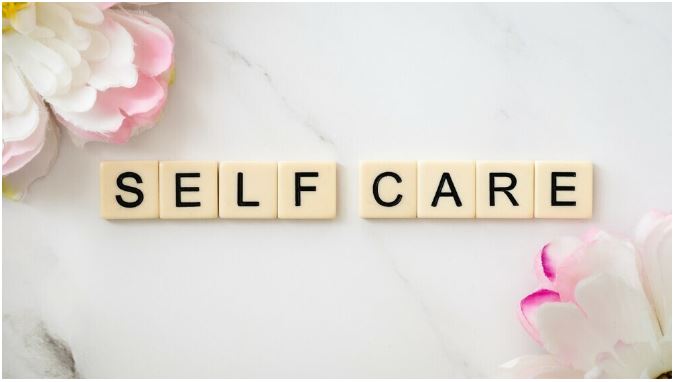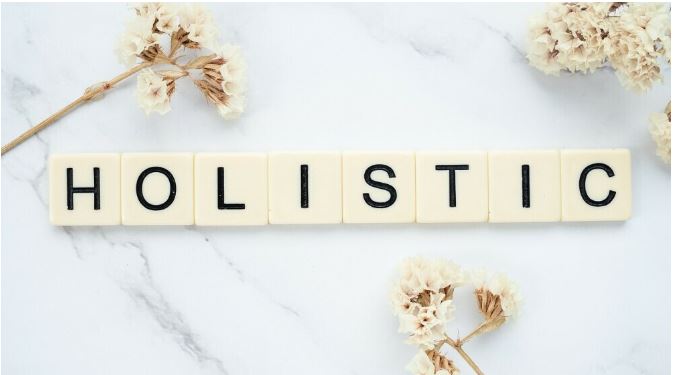Starting A Holistic Self-care Routine: 11 Routines To Adopt
Starting a holistic self-care routine? Not exactly sure what that entails? I’m going to help you learn what a holistic self-care routine is and how you can easily create your own!
It’s an approach that looks at you as a whole person, not just as an individual with isolated issues or areas of focus. It entails addressing your mental, physical, emotional, and spiritual health collectively. This isn’t just about taking a yoga class for flexibility; it’s also about nurturing your mind and spirit in the process.
Traditional self-care might have you think about taking a bubble bath or getting a massage – and while those are definitely pleasant, holistic self-care digs deeper. It involves practices that span across every aspect of your life, ensuring that each part is equally cared for and balanced. It helps you develop a comprehensive strategy for wellness that adapts and grows with you over time.
You might be wondering why you should consider this approach. The benefits of holistic self-care are as multifaceted as the practices themselves. From improved mental clarity and stress resilience to enhanced physical health and deeper self-awareness, it’s a game-changer. Plus, it’s all about sustainability – establishing habits that support your well-being for the long haul, not just quick fixes that fade away.
And let me tell you, embracing holistic self-care is not about setting a linear path with a specific end goal. It’s an ongoing journey that evolves as you do. Every step you take is a step towards a more harmonized and authentic version of yourself. This is a dynamic process where you are continually learning and adapting new ways to care for your wellbeing.
With all of that in mind, let’s transition into what makes holistic self-care truly unique. You’re going to find out about its distinctive qualities and how it can enrich your life beyond the usual self-care routines.

Understanding Holistic Wellness and Its Significance
I’m going to dive into the core of what holistic wellness really means and why it matters so much in our hectic lives. This goes beyond just eating right or hitting the gym. It’s about nurturing every aspect of your being.
At its heart, holistic wellness is an ongoing process of seeking balance and harmony. It recognizes the individual as a whole; made up of interdependent parts, where if one part is not working properly, all the other parts will be affected. This isn’t just about physical health, it’s also about emotional stability, mental clarity, and spiritual fulfillment.
So why is this kind of wellness so vital?
- Empowerment: Holistic healing empowers individuals by helping them understand their innate ability to heal. It involves educating patients on healthy practices and lifestyle changes
- Spiritual Health: Individuals who maintain spiritual health find purpose and meaning in life. They tend to be more resilient, motivated, and have a higher sense of satisfaction
- Balances Body Systems: Holistic medicine works by correcting deficiencies, balancing body systems, and promoting good health
- Eases Mental Health Issues: Research suggests holistic therapy can help alleviate trauma, anxiety, and depression. It may also improve relationships and overall well-being
- Personalized Care: Holistic treatments focus on improving overall health using natural methods and personalized care, emphasizing prevention over treatment
- Emphasizes Spiritual Aspects: The holistic health movement underscores the importance of spiritual aspects in overall well-being. Health challenges or healing often involve a spiritual journey
- Improved Overall Health and Well-being: A holistic approach to living can lead to improved physical health, balanced emotions, reduced levels of stress, depression, and anxiety, relief from chronic pain, and a sustained sense of well-being
- Versatile Treatment Options: Holistic healthcare can be used to treat a wide range of conditions, from insomnia and anxiety to chronic diseases
Nature plays a strong role in holistic wellness, too. Spending time outdoors, practicing ecotherapy, or simply engaging with the environment in a meaningful way can have profound effects on your wellbeing. It’s about creating harmony with the natural world, which can often lead to a sense of peace and grounding.
In my opinion, when you truly invest in your personal wellness from a holistic perspective, the benefits are immeasurable. It’s not just your body that heals and strengthens—it’s also your mind opening up to new possibilities and a spirit that finds joy in the everyday. When you take care of all aspects of yourself, you’ll start to notice a vibrant thread of vitality weaving through your life.
Fostering Wellness: 11 Holistic Self-Care Routines to Adopt
You might be wondering what you can do on a daily basis to embrace holistic self-care. I’m going to outline 11 routines that you can inject into your life to cover all aspects of your being. The beauty of these practices is that they’re flexible and can be tailored to fit your unique needs. Choose what resonates with you and leave the rest behind. 🙂
1. Mindfulness and Meditation
Mindfulness and meditation are vital components of a holistic self-care routine. They involve focusing on the present moment and cultivating a sense of peace and self-awareness.
Daily Practices
- Spend 10 minutes in the morning or evening sitting quietly, breathing deeply, and observing your thoughts without judgment.
- Try guided meditation apps to help you stay focused and calm throughout the process.
- Incorporate mindful moments into your day—take deep breaths before sending emails, eating, or transitioning to a new task.
2. Physical Activity
Physical activity is crucial in maintaining a healthy body and mind. It boosts endorphins, which decrease stress and anxiety levels.
Daily Practices
- Integrate at least 30 minutes of physical activity. This can be anything from a brisk walk or yoga to more intense exercise like cardio workouts.
- Stand up and stretch every hour, especially if you have a sedentary job.
- Consider activities that connect you with nature, such as hiking or biking, which can enhance mental clarity.
3. Nourishing Your Body
What we put into our body significantly affects our energy levels, mood, and overall health.
Daily Practices
- Start your day with a balanced breakfast that includes protein, healthy fats, and fiber to fuel your body.
- Drink plenty of water throughout the day to stay hydrated and aid digestion.
- Plan your meals to include a variety of whole foods rich in essential nutrients.
4. Resting
Quality rest is non-negotiable in a holistic self-care routine because it allows the body and mind to recover from the day’s stresses.
Daily Practices
- Aim for 7-9 hours of sleep each night in a dark, quiet, and cool environment.
- Establish a bedtime ritual to signal your body it’s time to wind down, such as reading or a warm bath.
- Limit screen time at least an hour before bed to reduce blue light exposure, which can disrupt sleep patterns.
5. Practicing Gratitude
Practicing gratitude shifts your focus from what’s lacking to the abundance that’s present in your life, nurturing a sense of contentment.
Daily Practices
- Keep a gratitude journal where you write down three things you’re thankful for each day.
- Share your appreciation with others—thank a coworker, send a note to a friend, or compliment a stranger.
- Reflect on the good moments or achievements at the end of the day to foster positivity.
6. Walking
One of the most accessible forms of exercise, walking has numerous benefits. It’s a low-impact activity that can help reduce stress and anxiety, boost mood, improve cardiovascular health, and increase overall energy.
Daily Practices
- Set a Daily Goal: Aim for a specific number of steps each day or dedicate a certain amount of time to walking.
- Make It Enjoyable: Walk in nature, listen to music or a podcast, or invite a friend to join you.
- Incorporate it into Your Lifestyle: Consider walking to work or taking the stairs instead of the elevator.
7. Practice Saying No
Protect your time and energy by setting healthy boundaries and learning to say no.
Daily Practices
- Understand Your Priorities: Know what’s important to you and be ready to say no to things that don’t align with those priorities.
- Be Direct but Polite: You can decline requests respectfully without having to provide an elaborate explanation.
- Start Small: Practice saying no to small requests before tackling bigger ones.
8. Mindful Morning Routine
How you start your day often sets the tone for the rest of it. Establish a morning routine that promotes mindfulness and prepares you for a balanced day ahead.
Daily Practices
- Wake up Gently: Instead of a jarring alarm, choose soothing sounds or wake up naturally with the sunrise.
- Express Gratitude: Take a moment to reflect on what you are thankful for each day.
- Meditate: Begin with a short meditation to clear your mind and focus on the present moment.
9. Acupuncture
This ancient Chinese medicine practice can help promote relaxation, reduce pain, and improve overall wellness.
How to incorporate acupuncture:
- Do Your Research: Look for a licensed practitioner with good reviews and experience.
- Schedule Regular Sessions: Like any therapy, consistency is key, so aim for regular appointments.
- Listen to Your Body: Monitor how your body responds to treatments and adjust accordingly.
10. Plant Something
Connecting with nature through gardening can be therapeutic and grounding.
Daily Practices
- Start Small: Begin with a few potted plants or a small garden bed.
- Choose Plants You Love: Pick plants that you find beautiful or that you can use in your cooking.
- Enjoy The Process: Take time to enjoy the process of tending to your plants regularly.
11. Social Connections
Lastly, nurture your social connections. Humans are social beings, and having a supportive community contributes to emotional and mental well-being. Engage in activities that allow you to connect with others in meaningful ways – it’s sure to uplift your spirits.
These routines are just getting started – there’s a whole world of holistic wellness that beckons your exploration. Let’s continue by understanding the significance of holistic wellness, and why making it a priority isn’t just beneficial, it’s imperative for a balanced life.
Unifying Mind and Body: The Pinnacle of Holistic Self-Care
In my opinion, appreciating the intricate connection between our mental and physical health is the cornerstone of holistic self-care. You’ve learned how each aspect of our being feeds into another, highlighting the undeniable synergy that is the mind-body connection. It isn’t just about eating right or exercising; it’s about recognizing the feedback loop where thoughts affect physiology and vice versa.
This is the strategy I like to leverage: realistic practices like yoga or tai chi, which calm the mind while strengthening the body, or meditation that helps in managing stress and, in turn, reduces the strain on your body. Choose something that resonates with you, and remember, your first attempt doesn’t need to be your last. There’s a lot of opportunity in tailoring your approach to your own personal wellness.
So my question to you today is, how will you begin to more consciously integrate the mind-body connection into your daily life? Whether it’s adopting a short meditation routine, practicing deep breathing exercises, or simply being present during a long walk, start with small steps. Don’t worry too much about perfecting your routine from the start—you can always adjust your approach down the road.
I really hope that this exploration of holistic self-care sparks a renewed commitment to your well-being. Embrace the principles discussed today; let them guide your self-care journey. Trust that investing time in your holistic health is not just a gift to yourself, but a foundation for a more vibrant, fulfilling life. I’m here to help you with any questions or further guidance you may need on this rewarding path.






